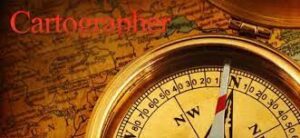Cartographers perform the essential task of researching, studying, and preparing maps for educational, legal, governmental, and social uses. This role can be highly fulfilling for candidates interested in learning and applying high-level analytical and mathematical skills in a professional capacity. If you’re considering a career as a cartographer, it may be helpful for you to learn more about this position. In this article, we outline what a cartographer does, including the various pros and cons of being one, and tips for determining whether this career path is right for you.
Recommended
What does a cartographer do?

Cartographers gather and analyze geographic data to prepare maps and other spatial diagrams for various purposes. These professionals frequently perform research and collect information from surveys, photographs and satellite imaging to accomplish this goal.
Cartographers may work in multiple industries and can typically find employment with engineering firms, architecture firms or government agencies, such as departments of transportation, land management or urban planning. While the exact duties of a cartographer may vary depending on their level of experience and place of employment, here are a few essential responsibilities most cartographers assume:
-
Research and assemble data for map drafts
-
Analyze surveys, photos, records, reports and original mapping
-
Determine hydrograph, topography and other mapping features
-
Prepare and finalize maps, tables, charting, drawings and 3D models
-
Use stereo plotting and drafting instruments
-
Operate stereoscopic and computer graphics tools
-
Examine legal data to determine boundaries of properties
Pros of being a cartographer
There are various advantages to working as a cartographer. Here are some benefits explained:
1. Hands-on duties
Cartographers often work in a hands-on capacity, producing work for practical purposes. These professionals typically employ a combination of creativity and logical thinking in their role to analyze information, create rules and organize visual data. For those candidates who enjoy problem-solving and generating innovative solutions, this type of work can be highly compelling.
2. Results-oriented work
A career as a cartographer typically requires professionals to work in a results-oriented environment. Therefore, in this role, it can be helpful to have a certain level of dependability, initiative, attention to detail and adaptability. If you value the ability to work toward tangible achievements, a career as a cartographer may be of interest to you.
3. Independence
Cartographers often work independently as they perform their day-to-day duties. While cartographers may work alongside others in a limited capacity, these professionals may spend the bulk of their time alone, compiling data from various sources and synthesizing this information to create maps or mapping systems. This type of environment can be highly beneficial for those candidates who prefer to work independently rather than in a heavily team-focused environment.
4. High salary potential
Cartographers may have the ability to earn high rates of compensation depending on their level of education, location and place of employment. The national average salary for a cartographer is $66,851 per year, with the potential to earn various employer-sponsored benefits like health, dental and vision insurance, paid time off (PTO), tuition reimbursement and flexible spending accounts. In some cities, cartographers may earn significantly more due to a higher demand for these professionals.
Cons of being a cartographer
While there are many advantages to this career path, working as a cartographer also presents some disadvantages depending on your preferences as a professional. Here are some cons of being a cartographer explained:
1. Few mentorship opportunities
Since working as a cartographer often entails a significant amount of independent work, these professionals typically have few opportunities to mentor or teach others. If you’re a professional who values working alongside colleagues and interacting with junior team members, this type of work may not be the best fit for you. There are alternative geoinformatics careers available through which professionals can work in a mentorship capacity.
2. High barrier to entry
Prospective cartographers often have to meet a high barrier to entry when pursuing their careers. Candidates for cartography roles typically must earn a minimum of a postsecondary certificate or bachelor’s degree in fields like geographic information science, engineering or mathematics. They also usually pursue hands-on learning opportunities like internships to gain a foundation of experience in their field prior to earning licensure.
3. Work environment
Cartographers frequently work in an independent capacity. In addition, these professionals may work exclusively in an indoor office environment, depending on their exact position. Therefore, if you prefer to work in a collaborative manner or are seeking a career through which you can work outdoors, being a cartographer may not be suitable for your needs.
4. Work schedule
Cartographers may work long hours and have varying schedules depending on the needs of the organizations where they find employment. Some cartographers who work full-time may have schedules of over 40 hours per week, which is the standard for typical full-time roles. With this, if you’re seeking a role with a less demanding, flexible schedule, it may be beneficial for you to pursue other career paths in the geoinformatics field.
Tips for determining whether to become a cartographer
When determining if a career as a cartographer is right for you, it’s important to consider the various pros and cons. With these factors in mind, here are a few tips for deciding whether to pursue this role:
-
Identify your work style. Consider whether you prefer to work independently and if hands-on, practical tasks suit your needs as a professional, as this work style is typical of cartography careers.
-
Determine what work environment suits you best. Since cartographers frequently work indoors and may have to work over 40 hours per week, determine whether this environment is right for you.
-
Examine your ability to meet entry requirements. To be eligible for a career in cartography, you may need to pursue a postsecondary certificate or bachelor’s degree, so it can be helpful to examine your ability to meet these entry requirements.
I hope you find this article helpful.